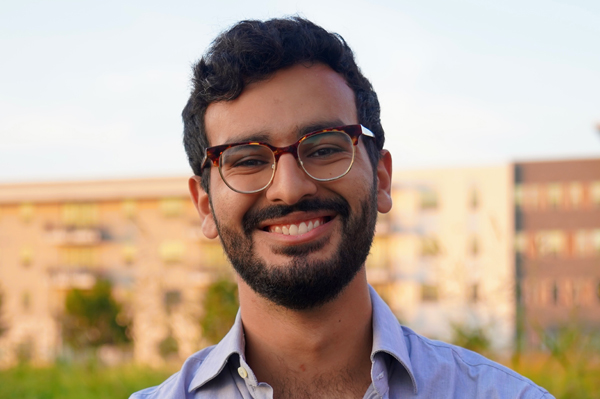Past Event: PhD Dissertation Defense
Bassel Saleh, Ph.D. Candidate, Oden Institute
12 – 2PM
Monday Dec 2, 2024
POB 6.304 and Zoom
Gravitational wave detections made by the LIGO, Virgo, and KAGRA Collaborations in recent years have given rise to the field of gravitational wave astronomy, which aims to understand exotic objects in the Universe through their gravitational signatures. Prototypical sources of gravitational waves (GWs) include inspiraling binary black hole and neutron star systems, both of which have been observed by these detectors. A core component of GW astronomy is the analysis of noisy observations in order to infer the properties of the sources that produced them. This objective amounts to solving a Bayesian inverse problem, in which the values of model parameters are inferred along with appropriately quantified uncertainty.
To solve a Bayesian inverse problem requires a computational forward model to provide a mapping from parameters of interest to observable quantities. In the context of GW astronomy, there is a wide spectrum of numerical models used for this purpose, each with its tradeoffs and advantages. However, the highest-fidelity models required for the most accurate inferences are computationally expensive, limiting applications to near-real time inference and to large catalogs of detections. This is a core challenge of GW parameter estimation, as it is in a wide range of Bayesian inverse problems throughout science and engineering applications.
In this dissertation, we address this core challenge by recognizing the multifidelity nature of GW models, and we seek to exploit this variety to accelerate the solution of the Bayesian inverse problem at the heart of GW parameter estimation. The presented work is divided into three primary investigations. In the first, we develop a framework for optimally tempering low-fidelity posteriors to improve the efficiency of multifidelity importance sampling. In the second, we build on this paradigm by employing the posteriors of Bayesian approximation error (BAE) as biasing distributions, again to improve importance sampling efficiency. In both studies, we investigate the efficacy of our ideas on a series of analytical test problems, to gain insight on the types of problems that benefit from these methods, and we further test them on real data from the third gravitational wave transient catalog (GWTC-3). In the third investigation, we develop a new data-driven surrogate model to complement the existing roster of GW models, which we call noise aware neural operators (NANO). We demonstrate the effectiveness of NANO by training our networks on synthetic GW data and using them to perform Bayesian inference.
Bassel is a PhD candidate in the Center for Optimization, Inversion, Machine Learning, and Uncertainty for Complex Systems in the Oden Institute. He is supervised by Prof. Omar Ghattas, and he has also worked closely with the Center for Gravitational Physics, co-supervised by Prof. Aaron Zimmerman. His work focuses on the Bayesian parameter estimation problem in gravitational wave data analysis. Bassel received Bachelor's degrees in physics and computer science from The University of Texas in Austin.
